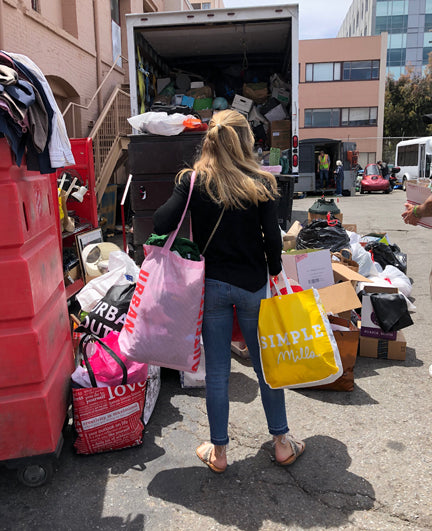Too Much Stuff
 My daughter graduated from college this summer and came back to live at home for a while, to save up money for her own apartment in San Francisco with a girlfriend in the new year. She brought back two carloads of clothes, shoes and household items and spent a week sorting and purging piles of unwanted stuff before her new job started. "Mom, I'm never buying anything again", she said, before we headed out to Goodwill to unload her unwanted. But when we got to Goodwill, the parking lot was so full of others discarded items, we could barely find a place to put them.
My daughter graduated from college this summer and came back to live at home for a while, to save up money for her own apartment in San Francisco with a girlfriend in the new year. She brought back two carloads of clothes, shoes and household items and spent a week sorting and purging piles of unwanted stuff before her new job started. "Mom, I'm never buying anything again", she said, before we headed out to Goodwill to unload her unwanted. But when we got to Goodwill, the parking lot was so full of others discarded items, we could barely find a place to put them.


We headed to the shopping mall to buy a few work clothes for Olivia's new job, feeling guilty that we were already breaking her new resolve. But her Santa Barbara beachwear was not going to cut it at her downtown office job with clients like Cysco, Oracle and Salesforce. After checking the regular stops at Madewell, Banana Republic and Nordstrom with little success, we ended up at Zara, purveyors of fast fashion, who add insult to injury by not even offering seating for weary parents and friends in waiting. Instead of walking out to a mall bench, I took pictures of the piles of cheap clothing, heaped upon others, with sales signs flashing red above the merchandise. Anyone who has watched The True Cost, or who follows the ethical fashion movement knows how harmful fast fashion is for the people making it and the environment in which it's produced. The factory workers are receiving sub-standard wages, typically working in inhumane conditions, and the factory emissions are polluting their local air and water, all so Americans can buy inexpensive, disposable clothing. At one point in the True Cost, an Indian worker picking through piles of used clothing shipped from the US, says to her co-worker, that Americans must not be able to wash their clothes, which is why they give them away before they are worn much.


I made a date with my Keena Co. boss Adriana Mello, to attend a panel discussion about the future of retail, sponsored by Faire, who is bringing wholesale to retailers online. She and I were gearing up to start another trade show season, with set-up for showrooms in Oakland, Las Vegas and Los Angeles, along with attending NY Now, all within the course of two months. After setting up and working the trade shows, the follow-up with retailers is equally demanding, ensuring customers get the product they ordered in time for their specific sales season. Faire is competing with wholesale rep groups, to offer direct online service to retailers, eliminating the need to attend shows or meet with reps in person. Who knows, with retail customers now shopping for products more online than in stores, perhaps wholesale will follow suit?
After the panel discussion that seemed tailored more for makers than buyers, Adriana and I spotted our first Amazon store and ventured in using her Amazon Prime account number, as I don't order from them. There we were greeted by one Amazon employee, who was not a salesperson. Everything was self-serve; prepared fresh food in plastic containers, and beverages in bottles and cans under the Amazon Brand. Adriana grabbed a drink and a chocolate bar for her husband, and we walked out of the store. Her phone was charged the amount owed, no personal transaction, no conversation needed, right on trend with the evening. I just wondered what they do with all the expired food each day, and whether the plastic gets thrown out too?


Arriving at the airport for my flight to NY Now, I stopped in the terminal to look more closely at an installation of color photography by Alejandro Duran from his work called Washed Up. Alejandro photographs the international debris washing up on Mexico's Caribbean coast into aesthetic yet disquieting works of art, reflecting the infiltration of plastics into the natural environment. More than a surreal landscape, Duran's images serve as a reminder of the dire consequences of worldwide environmental pollution. Duran has identified plastic waste from 58 nations that has riddled the shore along the coast of Mexico's largest federally protected areas and a designated UNESCO world heritage site. Through his images, Duran depicts a new form of colonization by consumerism, in which even protected land is threatened by our relentless consumer culture of disposable products.


What can we do to reverse course? Can we change or even influence the future of shopping and the disposal of our waste? I've asked my family to refrain from Amazon whenever possible, and try purchasing at a local stores. Olivia has been using Poshmark or Crossroads to buy used, but new-to-her clothing. I am trying not to buy anything in single use plastic, including food, and we're buying our produce from the farmer's market and meats from our local market counter, wrapped in compostable paper. As progressive Californians we are trying to influence other states to vote for recycling programs and cleaner air and water standards. It's all our country and all our world and we obviously need a better government to take care of it.

Congratulations on your graduation Olivia! You are a global citizen and we trust you to take better care of this world than we were able to. Keep that pledge to buy less, and when you need to, buy better quality or gently used items whenever possible. Stay away from disposables, bring your own bags, order take-out only in compostable containers and cook at home most of the time with fresh food. Avoid Amazon, support your local retailer and have conversations with friends and strangers in person whenever possible. And teach us a better way to save the planet along the way, thank you.
